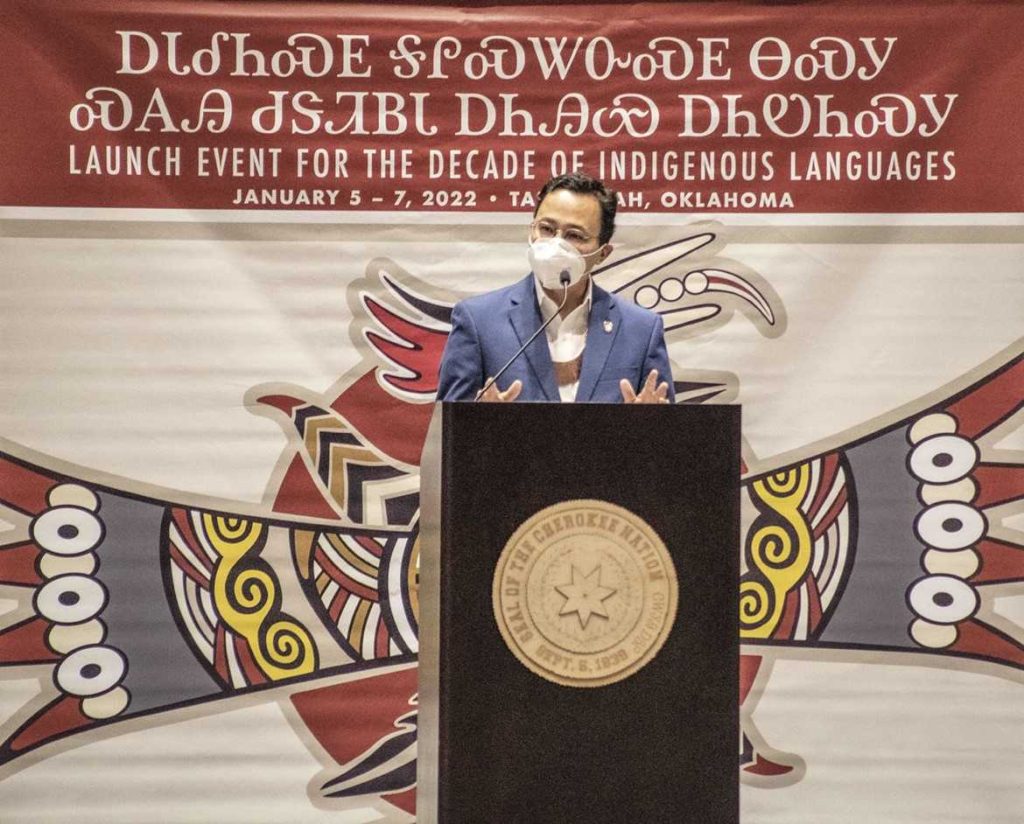Cherokee Nation holds the World’s First Event and Promotes Intertribal Resolution
By Ariel Barbieri-Aghib, Law Student, University of Colorado
Tribal governments are prioritizing the revitalization of Indigenous languages. In January, the Cherokee Nation hosted the world’s first launch event for the International Decade of Indigenous Languages 2022-2032 (the Decade), a global commitment to protect and promote Indigenous Peoples’ languages. These efforts reflect the dire situation of Indigenous languages following centuries of oppression by national governments seeking to impose linguistic homogony. Today, experts estimate that one of the world’s 7,000 languages dies every two weeks and, along with it, irreplaceable knowledge and cultural traditions.
The United Nations Declaration on Rights of Indigenous Peoples recognizes the rights of Indigenous Peoples to “use, revitalize, and develop” their languages, as well as the right to transmit Indigenous languages to future generations. To realize these rights, national and Indigenous leaders from countries including Australia, Canada, Iceland, Norway, Russia, Thailand, Ukraine, and Zimbabwe met over the last year to create a Global Action Plan for the Decade. The Russian Federation has also developed a draft national plan committing to language revitalization during the Decade.
Unfortunately, the United States is not yet participating in the global meetings and has no action plan for the Decade. The U.S. has not remedied the impacts of federal Indian boarding schools, which operated for over 100 years with the goals of eradicating Indigenous languages and cultures, though it has announced the Federal Indian Boarding School Initiative as a step toward accountability.

Co-hosted with several nonprofit organizations, the Cherokee Nation’s launch event took place in Tahlequah, OK, on January 5-7, 2022. Principal Chief Chuck Hoskin, Jr., gave a stirring call to action, saying: “We know that destroying Indigenous languages has been the work of nations. We’ve got to insist that rebuilding Indigenous languages also has to be the work of nations. That’s what is at the heart of this International Decade of Indigenous Languages, that reconciliation and that healing for all of mankind.” Language Program Director Howard Paden discussed the Cherokee Nation’s immersion schools, master apprentice language program, technology and media initiatives, as well as housing and health care for fluent speakers.
Attendees at the launch event included Cherokee, Lakota, Mohawk, and Yuchi speakers from the U.S., along with Itelman speakers from Russia, Maori speakers from New Zealand, and Nahuatl speakers from Mexico, who gathered to share best practices in language revitalization. Professor Kristen Carpenter, Co-lead of The Implementation Project, introduced Grand Chief Wilton Littlechild from Canada. Carpenter emphasized that “language rights are human rights,” necessary to ensure that Indigenous Peoples can obtain health care, practice their religions, speak freely, and participate in political processes.
On January 14, 2022, the Inter-Tribal Council of the Five Civilized Tribes (ITC) passed a unanimous resolution declaring its support and commitment to the United Nations International Decade of Indigenous Languages 2022-2032. The Inter-Tribal Council of the Five Civilized Tribes is a national organization representing the tribal governments of the Cherokee, Chickasaw, Choctaw, Muscogee (Creek) and Seminole Nations, and over 810,000 tribal citizens. The ITC resolution calls on the United States to join the global effort to revitalize Indigenous languages by participating in UN activities and announcing a national action plan for the Decade. The Shawnee Tribe has also declared the Decade of the Shawnee Language, committing the efforts of tribal government to provide the education needed for a new generation of language speakers.
The Implementation Project is a joint initiative of the Native American Rights Fund and University of Colorado Law School to advance education and advocacy regarding the United Nations Declaration on the Rights of Indigenous Peoples.
